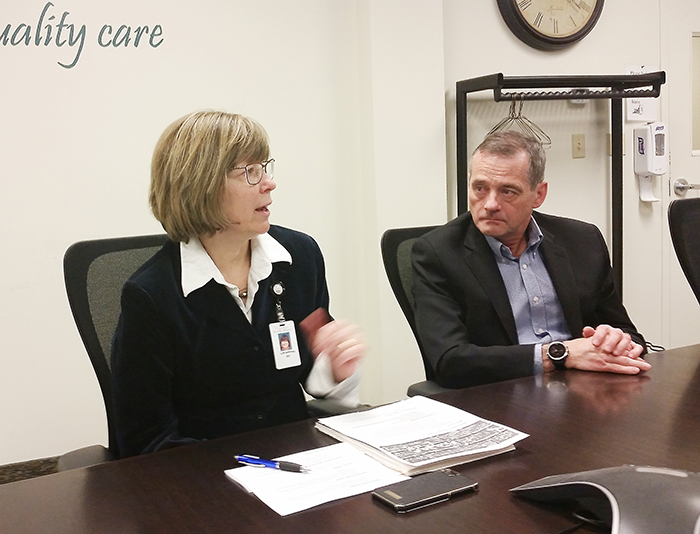
Restructuring at the Chatham-Kent Health Alliance is so close to completion that provincially appointed hospital supervisor Rob Devitt sees a light at the end of his tunnel.
Called upon by the provincial government back in September of 2016 to rebuild the governance and administration of the alliance, Devitt said the effort has reached the point where he envisions himself soon being back in retirement and atop his mountain bike.
“We’ve started advertising for board members,” he said, adding he hopes to have the board in place and in training by late February.
It’s essentially the final phase in the rebuild, which saw the CKHA cull top administration, cut spending and improve efficiency, all while stressing the two-site model – hospitals and emergency departments in Chatham and Wallaceburg – is a necessity.
Lori Marshall, president and CEO of the CKHA, said a recent review of the ERs encouraged the two-site model, and hospital officials are working to standardize the practises for both sites.
The two sites will come with one board. Devitt said having the alliance operate with a supervisor as “the board” may streamline matters and improve efficiency, but it’s not the best model.
“It’s healthy to have people with diverse backgrounds. Having a supervisor is efficient, but I think it actually creates risk,” he said.
Marshall agreed with the need for diversity.
“It’s important for us to have local governance and to hear a variety of voices,” she said. “It’s important to have that broader perspective.”
As of last week, 32 people applied to be members of the board, and interviews could begin this week.
The training for the board is designed to help bring everyone together.
“We need to make sure there is a common knowledge base. But we also need them to start to gel as a team. Leadership is all about team,” he said.
Devitt looks forward to seeing how the new board takes to the challenge.
“I think there are some really good candidates,” he said.
He added that a few of the applications are from outside the municipality, but most came from within. Geographical location won’t have a bearing on board composition, however.
“Skills come first. That has to be the number one criteria,” Devitt said.
When the board takes over, Devitt said his supervisory role would become obsolete. He said he’s targetting late March as the time to ask the government to pull the plug on his role with the CKHA.
The new board will replace Devitt, who in turn replaced the three hospital boards that came before him and had broken down into dysfunction and infighting. With the one-board system in place and approved by the Erie-St. Clair Local Health Integration Network, the Sisters of St. Joseph organization will no longer be part of the hospital. In the past, the organization was attached to the St. Joseph Hospital element of the alliance.
Marshall said staff are in the process of doing an inventory of the Catholic assets and items in the alliance facilities.
“We’re finding out what needs to go to the Catholic Church or with the sisters,” she said.
Those assets include statues, pieces of art, crosses and various items in the chapel, Marshall said.
Devitt said the sisters will receive $2 million in compensation as well.
“There needs to be a recognition of a century of contribution,” he said of the sisters. “We’re trying to do this in a way to celebrate our past. It’s part of our DNA.”
Change of culture at the hospital is now part of the short-term DNA at the CKHA. According to a recent survey among Chatham-Kent Health Alliance staff, their workplace is greatly improved since change began in the fall of 2016.
Marshall said a staff survey in the fall of 2016 asked staff to rate the alliance in terms of what it was like as a workplace.
Only 57 per cent said it was a positive place to work.
That number jumped up to 74 per cent in a recent survey, she said.
“We’re still not where we’d like to be,” Marshall said.
Efforts are underway to improve communication at the hospitals, as well as to improve the understanding of what coworkers do.
Another change that’s underway is how the hospital spends its dollars. Marshall said she expects at the end of this fiscal year the hospital will have a small surplus. The previous administration had for years operated in the red.
“That’s important as we look to continue to invest in new equipment,” she said of working with a surplus.
The health alliance is also looking for patient advisors, Marshall added. People who have recently had experiences at the alliance – either as a patient or relative of a patient – are encouraged to consider seeking a volunteer advisory position.
Marshall said the goal is for the CKHA to continue to improve.
“We involve patient advisors in all our leadership hires. We’re looking for lots of different people with different backgrounds who have an interest in us getting better,” she said.






